Returning to roots
Xiban is not a new name for many live music fans in the city; the band has performed at local venues such as Mao Livehouse and Yuyintang from time to time since its formation in 2009. But Xiban's style of music, which is based on traditional Chinese folk and opera integrated with musical elements from around the world, can hardly be described as popular with local audiences surrounded by prevailing pop melodies.
In the interests of promoting traditional Chinese music, Life Hub@Jinqiao (3611 Jinqiao Road, 2023-3000) will host a free music project from September 27 to October 20, which will include live performances by notable musicians and an exhibition of instruments.
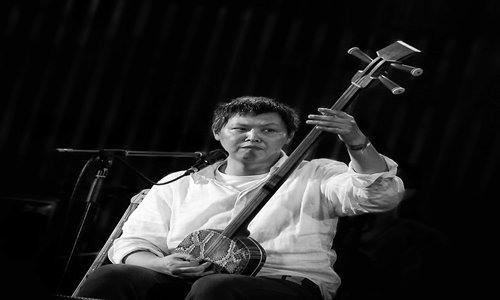
Xiban frontman Zhuma plays a traditional three-string instrument.
Highlights include the Shanghai-based Xiban; southwestern musician Wang Jiyun, known as Hanying (literally, "cold eagle"); and the Ju Percussion Group led by Ju Tzong-ching from Taiwan. The Global Times spoke with Xiban and Hanying about their music before the project kicks off this Friday.
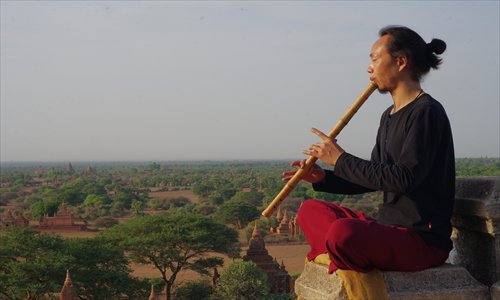
Hanying plays an instrument that he made himself. Photos: Courtesy of Life Hub@Jinqiao
Folk beginnings
Like most traditional Chinese folk musicians, Hanying grew up surrounded by ethnic minority cultures; he was born in Yunnan, the province with the largest population of minority groups in China.
As a child Hanying learned to play the cello. A decade ago, as he became increasingly interested in traditional folk music, he began creating musical instruments to mimic the sounds of nature.
So far, the 37-year-old has made over 30 instruments, 13 of which will be displayed at Life Hub. Among them are instruments inspired by natural sounds, as well as some traditional instruments of minority groups.
Xiban's frontman Zhuma was also born in a place endowed with folk cultures - Xinjiang Uyghur Autonomous Region. Growing up listening to Qinqiang (Shaanxi Opera), Dagu (drum storytelling from northern China), as well as the eight model operas, Zhuma said that all of those influences can be heard on the band's first album, Jiushi Zhege Diaodiao (literally, "Just This Tune"), which was released last year. The album was named one of the Top 10 Mandarin Albums at the Chinese Music Awards in 2012.
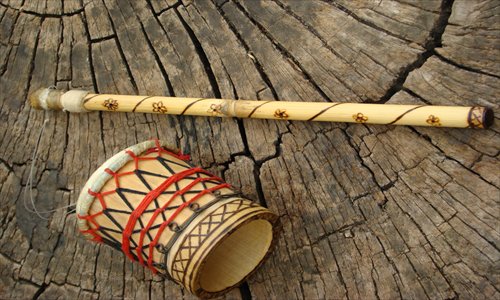
Traditional instruments made by Hanying: a xunhuan gu
Belief in traditional music
"Some Westerners don't like traditional Chinese music because they don't think it's beautiful and they think that the music has lost its roots and thus can only repeat some rigid forms," Zhuma recalled Western musicians he met at a music festival in Austria telling him in an email to the Global Times.
However, Zhuma compares the beauty of traditional Chinese music to the single-fold eyelids of Chinese people, saying that it may not be favored by all beholders but it has its own charm. "And Xiban is dedicated to finding the lost belief in traditional Chinese music." The current members of Xiban include songwriter and vocalist Zhuma, Inner Mongolia-born guitarist Li Xing, three-string lute player Lu Jiawei, drummer Qian Min, humai (a Mongolian vocal art) master Haiqing, and flute player Laodan.
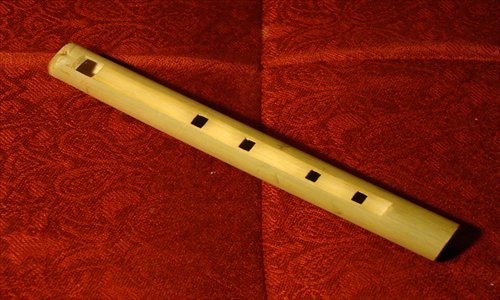
Traditional instruments made by Hanying: a fangniu di
While Xiban crafts experimental music that integrates folk traditions from around the world, their Yunnanese counterpart is devoted to the reproduction of the beauty of traditional music and nature.
Hanying spends most of his time walking in the mountains close to his studio to listen to the sounds of nature. He also visits folk craftsmen and communicates with musicians of different styles in order to replenish his knowledge of nature, life and music.
"Traditional Chinese culture is the wisdom produced during the negotiation between humans and other creatures in nature. It is the root from which Chinese civilization grows and flourishes, and music is a significant part of the culture," said Hanying, who hopes his naturalist music will remind people of the importance of maintaining harmony between humans and nature, and achieving inner peace.
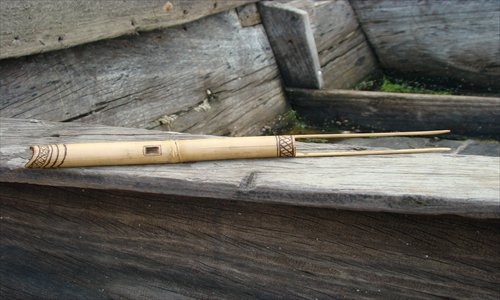
Traditional instruments made by Hanying: a daodao yunnan
Striving to survive
Hanying released his first album Door in 2007, and now is working on a new album called Shengzhang ("Growing"), both of which feature peaceful melodies generated from nature. He has also appeared at music festivals around the country over the years.
However, for Zhuma, it's a challenge to maintain a stable lineup for his band. The band's composition, which used to include foreign musicians, changed considerably last year. Zhuma explained that it was because the members didn't share common ideas for future plans and were playing out of personal interest. "A stable band is one collective spirit, which is more powerful than individuals, so establishing a stable lineup is a common goal of Xiban as well," added Zhuma.